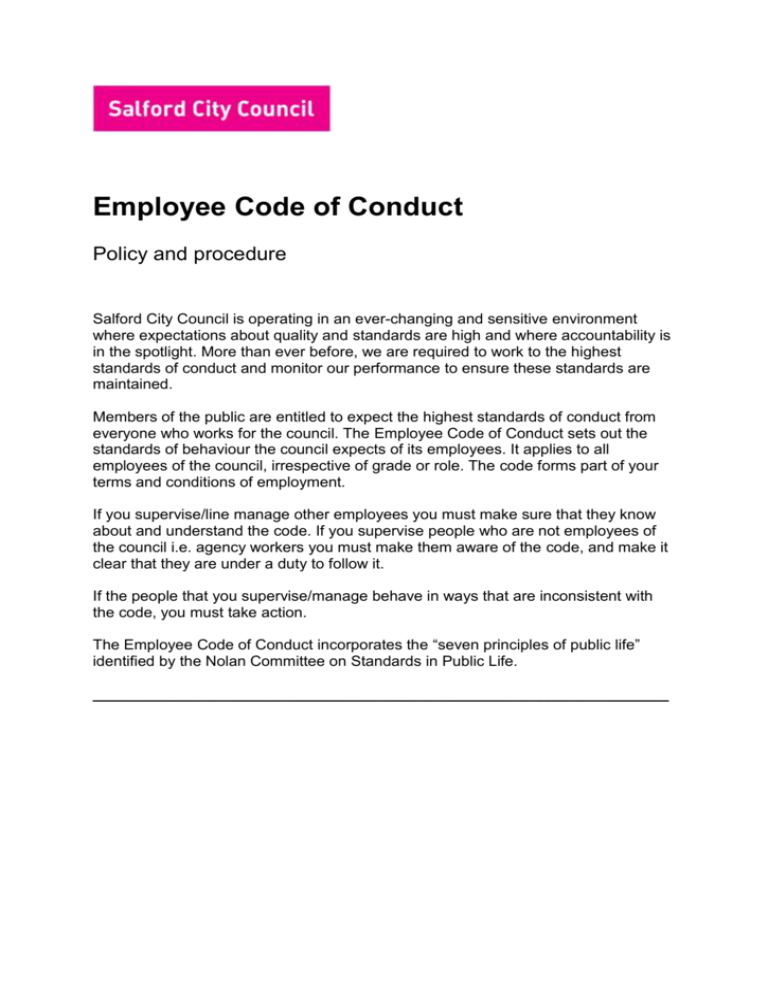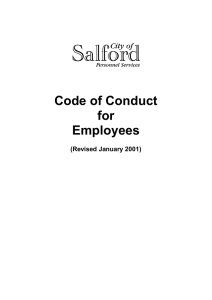Employee code of conduct (Microsoft Word
advertisement

Employee Code of Conduct Policy and procedure Salford City Council is operating in an ever-changing and sensitive environment where expectations about quality and standards are high and where accountability is in the spotlight. More than ever before, we are required to work to the highest standards of conduct and monitor our performance to ensure these standards are maintained. Members of the public are entitled to expect the highest standards of conduct from everyone who works for the council. The Employee Code of Conduct sets out the standards of behaviour the council expects of its employees. It applies to all employees of the council, irrespective of grade or role. The code forms part of your terms and conditions of employment. If you supervise/line manage other employees you must make sure that they know about and understand the code. If you supervise people who are not employees of the council i.e. agency workers you must make them aware of the code, and make it clear that they are under a duty to follow it. If the people that you supervise/manage behave in ways that are inconsistent with the code, you must take action. The Employee Code of Conduct incorporates the “seven principles of public life” identified by the Nolan Committee on Standards in Public Life. ___________________________________________________________________ September 2014 Part one – Standards of conduct The public is entitled to expect of a local government employee conduct of the highest standard and, where it is part of their duties, to provide appropriate advice to the City Mayor, councillors and fellow employees with impartiality. Public confidence in your integrity would be shaken were the least suspicion to arise that you could be influenced by improper motives. Your life away from work is normally your personal concern. You should not however put yourself in a position where your job, or the city council’s interests, and your own interests conflict. This includes behaviour which would undermine the council’s confidence or trust in you or that which could harm the council’s reputation. If you are graded above the pay point SCP 28 (Grade 3A and above) you must not carry out any other business or take up any other additional appointment, paid or unpaid, without the permission of your strategic director. We will not unreasonably prevent you carrying out other employment except where such employment, in the view of the council, conflicts with or reacts detrimentally to the council’s interests, or in any way weakens public confidence in the conduct of the council’s business. 1.1 Relationships The City Mayor and councillors: mutual respect between employees, the City Mayor and councillors is essential to good local government. You must not form close personal relationships with the City Mayor or individual councillors as this can damage your working relationship and could be embarrassing. NB A separate code of conduct also exists for elected Members. The local community and service users: employees should always remember their responsibilities to the community they serve and ensure courteous, efficient and impartial service delivery to all groups and individuals within that community as defined by the policies of the council. Close personal familiarity between employees and service users can affect impartiality and should, therefore, be avoided. Contractors/external service providers: all relationships of a business or private nature with external contractors, or potential contractors, should be declared to your manager/immediate supervisor who will maintain a formal record of all such relationships. Orders and contracts must be awarded on merit, by fair competition against other tenders, and no special favour should be shown to businesses run by, for example, friends, partners or relatives in the tendering process. No part of the local community should be discriminated against. Employees who engage or supervise contractors or have any other official relationship with contractors should familiarise themselves with Salford City Council's financial regulations and standing orders and should ensure that they are complied with in all aspects. 2 September 2014 1.2 Disclosure of information The council’s decision making process must be open and transparent. The law requires that certain types of information must be available to the City Mayor, Members, auditors, government departments, service users and the public. Salford City Council itself may decide to be open about other types of information. Employees must be aware of information which is open and that which is not, and act accordingly. If in doubt about any aspect of this provision you should seek advice from your manager or immediate supervisor. You should not communicate to the public any information in respect of agendas and reports or committee proceedings, which are designated as ‘not for publication’. Any requests from the public for the disclosure of items designated as ‘not for publication’ should be referred to the Democratic Services team who will advise as to whether or not disclosure is appropriate. You must treat any information that you have access to with the appropriate level of confidentiality. Information concerning the private affairs of an individual must not, under any circumstances, be supplied to any person unless the consent of that person is first obtained or where such disclosure is required or sanctioned by law. In any event, information should only be provided in response to written requests. You must abide by the rules and procedures of the council on confidentiality, information governance and information security. It is your responsibility to ensure that you understand and comply with these policies. You must not disclose information which is considered to be commercially sensitive to any person and must follow any policies or rules adopted by the council in respect of such information, particularly relating to competitive tendering. You must not use any information obtained in the course of your employment for personal gain or benefit, nor should you pass it on to others who might use it in such a way. 1.3 Appointments and other employment matters If you are involved in appointing people to posts in the city council you should make sure that that these are made on the basis of merit. It would be unlawful for an employee to make an appointment which was based on anything other than the ability of the candidate to undertake the duties of the post. In order to avoid any possible accusation of bias, you should not be involved in any stages of the selection and recruitment process if you are related to an applicant, or have a close personal relationship. Similarly, you should not be involved in decisions relating to discipline, promotion or pay adjustments for any other employee who is a relative, partner etc. 1.4 Personal interests You must declare to your manager/immediate supervisor: 3 September 2014 any non-financial interests that you consider could bring about conflict with the authority’s interests any financial interests which could conflict with the authority’s interests membership of any organisation not open to the public without formal membership and commitment of allegiance and which has secrecy about rules or membership or conduct. You must not be directly involved in the processing of any type of application for work, services or other matters in which you, or any close relative, have a personal interest. In this event you must inform your manager/immediate supervisor, as soon as you become aware of the application or matter in question. 1.5 Use of council facilities All employees should recognise that council facilities, equipment or other property are provided to facilitate the conduct of the council’s business. You should have regard to the ownership of intellectual property, including inventions, creative writings and drawings, or copyright. If these items are created as part of your normal course of employment they belong to the city council. 1.6 Corruption It is a serious criminal offence for you to corruptly receive or give any gift, loan, fee, payment, reward or advantage for doing, or not doing, anything or showing favour, or disfavour, to any person in your official capacity. If an allegation is made, the council has a duty to undertake a thorough investigation and you must prove that any such rewards have not been corruptly obtained. In appropriate cases the police will be asked to investigate the allegations and to take appropriate action. 1.7 Use of financial resources You must ensure that you use public funds entrusted to you in a responsible and lawful manner. You must strive to ensure value for money to the local community and to avoid legal challenge to the authority. You must always follow our financial regulations and comply with the council’s standing orders. 1.8 Gifts, hospitality and other benefits Acceptance of hospitality and gifts by employees from any body or person who have, or may in the future have, dealings of any kind with Salford City Council, could cause suspicion as to the motives involved and leave both the individual and the council vulnerable to criticism. You therefore must not accept any gift or other benefit offered to you by any person you have provided services to (or their partner or family member) or any person associated with an organisation which has, or wishes to have dealings with us. You must declare any such offer to your service head. The exception to this rule is where the ‘gift’ is of token value such as a diary, calendar or pen. If there is any doubt about whether a gift should be accepted it 4 September 2014 should be tactfully but politely declined. Any gifts which are received directly and without warning should be reported to your strategic director who will be responsible for determining whether the gift should be declined and returned. All cash or monetary gifts must be refused and as an employee you must not be a beneficiary in a client’s will. If you know that you, your partner or family member, have been made a beneficiary in the will of a service user or former service user you must immediately inform your strategic director. A modest amount of entertainment is a normal part of public life, but you must not risk undermining public confidence or allow it to appear that you could be improperly influenced in the way you carry out your duties. Hospitality is sometimes offered to employees and should only be accepted if there is a genuine need to represent the council, or to receive or give information. Offers to attend purely social or sporting functions should be accepted only when these are part of the life of the community or where the council should be seen to be represented. You must obtain your strategic directors approval before accepting any offer of hospitality. Before authorising any offer of hospitality directors should be particularly sensitive as to its timing in relation to decisions which the authority may be taking affecting those providing the hospitality, e.g. letting of contracts etc. Offers of hospitality or gifts must be refused where there is any potential for suggestions of improper motives or influences being inferred. 1.9 Sponsorship – giving and receiving Where an outside organisation wishes to sponsor or is seeking to sponsor a council activity, whether by invitation, tender, negotiation or voluntarily, the basic conventions concerning acceptance of gifts or hospitality apply. Particular care must be taken when dealing with contractors or potential contractors. Where the council wishes to sponsor an event or service, an employee or any partner, spouse or relative must benefit from such sponsorship in a direct way without there being full disclosure to their manager/immediate supervisor who will maintain a formal record of any such interest. Similarly, where the council, through sponsorship, grant aid, financial or other means, gives support in the community, employees should ensure that impartial advice is given and that there is no conflict of interest involved. 1.10 Separation of roles during tendering If you are involved in the tendering process or dealing with contractors, you should be clear on the separation of client and contractor roles within the authority. Senior employees who have both a client and contractor responsibility must be aware of the need for accountability, openness and confidentiality. 5 September 2014 If you are in contractor or client units, you must deal fairly and impartially with all customers, suppliers, other contractors and sub-contractors in accordance with agreed council policies. If you have access to confidential information on tenders or costs for either internal or external contractors you must not give it to any unauthorised person or organisation. 1.11 Employees facing criminal charges If you are facing criminal charges you must notify your immediate supervisor/line manager as soon as possible whether you feel the matter is relevant to your employment or not. Part two - Serving Salford City Council As employees you owe a duty of loyalty to the council and must not work against the best interests of the council. Employees serve the public and the city council as one entity. As employees we all have the responsibility to contribute to the overall aims of the organisation, including delivering efficient services and promoting a culture where everyone is treated with dignity and respect. It is vital that as employees you understand that the public has a right to expect the highest levels of integrity and responsibility from all staff. You must, at all times, act in accordance with the trust that the public is entitled to place in you as an employee of the council. 2.1 Duty of trust You must, at all times, act in accordance with the trust that the public is entitled to place in you as an employee of the city council. You are expected to be ready and able, at the agreed times, to carry out your job. Politeness and courtesy should be expressed to the public and to internal and external clients at all times. Customer care and courtesy must be maintained with appropriate professional boundaries. 2.2 Respect for others All members of the local community, clients and our employees have a right to be treated fairly and equally and with dignity and respect. You should be aware that your behaviour may inadvertently intimidate or offend other employees, service users or members of the public. The council is opposed to and will not tolerate all forms of discrimination, harassment, victimisation, and bullying and has procedures in place to deal with 6 September 2014 complaints of this nature. 2.3 Health, safety and welfare Salford City Council places a high priority on the health, safety and welfare of all employees, visitors and citizens. Employees have a key role to play in ensuring a safe and healthy work environment is developed and maintained. Therefore, all employees are expected to co-operate and contribute to this fundamental principle through compliance with the policies, practices, procedures and individual codes of practice, supported through participation in appropriate training and development events. 2.4 External communications You must not make any statements to the media, or any other public statement which concerns the business of the council, unless you have been authorised to do so. Council employees must clear any communication with the media or the public through the council’s communications team. Council officers must not discuss council business with the press or the public without express permission from their service head. This includes speaking, writing or giving interviews to the media. No employee should ever, either during the course of their employment or in their private life: publicise confidential information gained in the course of their employment maliciously undermine the council and it’s decisions by adverse or negative comments take personal issues concerning their employment to the media bring the council into disrepute by the extremity of their views. As employees you must: only deal with the media if you are authorised to do so ensure any dealings with the media in an official capacity are appropriate follow the rules for contact with the media in a personal capacity and/or in your capacity for other organisations not create a false impression that you are authorised to speak for the council if you do not have the authorisation to do so. If you are a trade union representative, local resident or member of a local action group, you should take care to ensure that any statements you make in such a capacity do not breach this code. The council recognises your right to take part in lawful trade union activity; however this does not extend to a right to make statements that are malicious, untruthful or irrelevant. 7 September 2014 By making public comments, for example through the media (social or traditional) you abandon any rights to have your comments treated as private and any intervention by the council may be justified without breaching your right to freedom of expression or a private and family life. Whenever there are restrictions on what you can communicate to people, or how you should communicate with them, it does not matter whether you are communicating face to face, by telephone, email, through social networking sites, or any other means. The rules apply to all ways of communicating. Inappropriate comments made on social networking sites (whether you have enabled privacy settings or otherwise) about your employment with the council, the council at large or any employees or former employees of the council could amount to a breach of this code and result in disciplinary action. Further details can be found in the Communications and Media Policy. 2.5 Political neutrality Employees serve Salford City Council as a whole. It follows that you must therefore serve the City Mayor and all councillors and not just those of the controlling group, and must ensure that the individual rights of the City Mayor and all councillors are respected. Subject to the council's conventions, employees may also be required to advise political groups. You must do so in ways which do not compromise your political neutrality. Employees, whether or not politically restricted, must follow every lawful expressed policy of Salford City Council and you must not allow your personal or political opinions to interfere with your work. Political assistants appointed on fixed term contracts in accordance with the Local Government and Housing Act 1989 are exempt from the standards relating to political neutrality. Part three – Reporting wrong doing Employees have a duty, without fear of recrimination, to report suspicions or knowledge of any wrong-doing you become aware of, for example: activities which you believe to be illegal, improper, unethical or otherwise inconsistent with the code anything which involves, or you think involves, irregularities with money or other property of the council council employees, or other individuals, being involved in potentially fraudulent or corrupt activities, or theft. 8 September 2014 You must report any alleged impropriety or breach of procedure to your line manager or strategic director so that the matter may be investigated immediately. Salford City Council has also introduced a variety of initiatives which are intended to combat fraud, corruption and waste within the authority. It is the duty of anyone who suspects malpractice to report the matter immediately so that it can be investigated. In addition anyone wishing to remain anonymous can report the suspected irregularity to any of the following: Head of Audit Phone 607 6958 Honesty Action Line 0808 100 1235 (Freephone) Assistant Director of Human Resources Phone 793 2000 City Director Phone 793 3400 District Auditor Phone 234 6347 Public Concern at Work Phone 0207 404 6609 Any Elected Member of the City Council Chairman of the Audit and Accounts Committee Greater Manchester Police An online reporting form is available at: http://intranet.salford.gov.uk/honestyaction.htm or you can write to the Head of Internal Audit, Unity House, Salford Civic Centre, Swinton, M27 5AW. Part four – Implementation It should be noted that this code sets the framework for the standards expected of our employees but is not intended to be a comprehensive or exhaustive list of the rules of behaviour. Conduct or behaviour not explicitly stated within the code may still not be acceptable – if you are unsure you should check. If you fall below the standards outlined in the code you may be referred into formal disciplinary procedures which could result in the termination of your employment. You must treat this code seriously and make sure you understand it. If you are not sure about any aspect or the council’s requirements with regards to the conduct of employees then you must speak to your line manager as a matter or urgency. This code, which supplements the National and Local Conditions of Service, relevant council policies, procedures, and standing orders, is applicable to all employees of 9 September 2014 the council. However, it should be noted that more detailed complementary information may be required within service groups to suit individual circumstances and situations for example, working with vulnerable clients. 10







